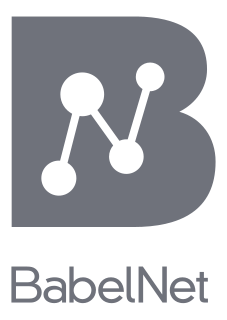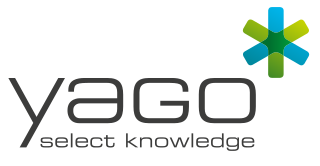 W
WBabelNet is a multilingual lexicalized semantic network and ontology developed at the NLP group of the Sapienza University of Rome. BabelNet was automatically created by linking Wikipedia to the most popular computational lexicon of the English language, WordNet. The integration is done using an automatic mapping and by filling in lexical gaps in resource-poor languages by using statistical machine translation. The result is an encyclopedic dictionary that provides concepts and named entities lexicalized in many languages and connected with large amounts of semantic relations. Additional lexicalizations and definitions are added by linking to free-license wordnets, OmegaWiki, the English Wiktionary, Wikidata, FrameNet, VerbNet and others. Similarly to WordNet, BabelNet groups words in different languages into sets of synonyms, called Babel synsets. For each Babel synset, BabelNet provides short definitions in many languages harvested from both WordNet and Wikipedia.
 W
WCyc is a long-term artificial intelligence project that aims to assemble a comprehensive ontology and knowledge base that spans the basic concepts and rules about how the world works. Hoping to capture common sense knowledge, Cyc focuses on implicit knowledge that other AI platforms may take for granted. This is contrasted with facts one might find somewhere on the internet or retrieve via a search engine or Wikipedia. Cyc enables AI applications to perform human-like reasoning and be less "brittle" when confronted with novel situations.
 W
WDBpedia is a project aiming to extract structured content from the information created in the Wikipedia project. This structured information is made available on the World Wide Web. DBpedia allows users to semantically query relationships and properties of Wikipedia resources, including links to other related datasets. In 2008, Tim Berners-Lee described DBpedia as one of the most famous parts of the decentralized Linked Data effort.
 W
WDocumenting Hate is a project of ProPublica, in collaboration with a number of journalistic, academic, and computing organizations, for systematic tracking of hate crimes and bias incidents. It uses an online form to facilitate reporting of incidents by the general public. Since August 2017, it has also used machine learning and natural language processing techniques to monitor and collect news stories about hate crimes and bias incidents. As of October 2017, over 100 news organizations had joined the project.
 W
WThe Google Knowledge Graph is a knowledge base used by Google and its services to enhance its search engine's results with information gathered from a variety of sources. The information is presented to users in an infobox next to the search results. These infoboxes were added to Google's search engine in May 2012, starting in the United States, with international expansion by the end of the year. Google has referred to these infoboxes, which appear to the right of search results, as "knowledge panels".
 W
WUMBEL is a logically organized knowledge graph of 34,000 concepts and entity types that can be used in information science for relating information from disparate sources to one another. It was retired at the end of 2019. UMBEL was first released in July 2008. Version 1.00 was released in February 2011. Its current release is version 1.50.
 W
WYAGO is an open source knowledge base developed at the Max Planck Institute for Computer Science in Saarbrücken. It is automatically extracted from Wikipedia and other sources.